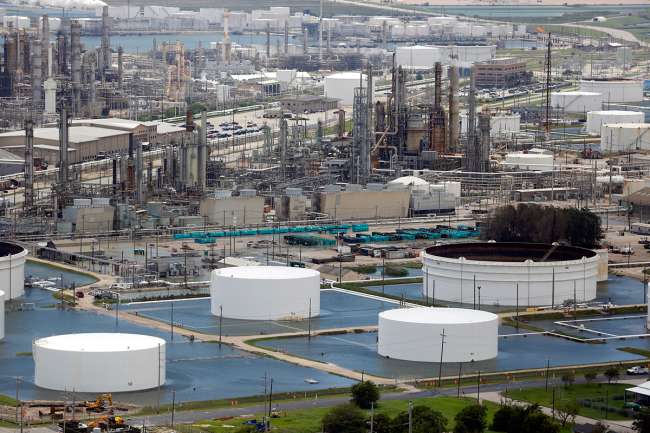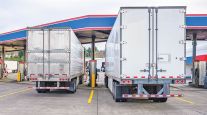Storms Hurt Fleets’ Ability to Pick Up, Deliver Fuel

Long lines at fuel refineries are shortening, but the crush in demand for fuel caused by Hurricane Harvey is still putting pressure on fleets that serve the petroleum industry.
“We were operating at about 50% productivity” in the Houston area about a week after the storm hit, said Reggie Dupré, CEO of Dupré Logistics, which is based in Lafayette, La. “We had pretty much all of our drivers at work. The main thing slowing us down was long lines to load trucks. Pulling up to a [fuel] loading rack, it usually takes about an hour, an hour and a half. They were waiting three to four hours.”
ROUTING NIGHTMARE: Carriers struggle to work around hurricane devastation.
That wait time was dropping to two to three hours as of Sept. 5, when Dupré spoke with Transport Topics. “More racks are opening up so trucks are being able to spread out,” he said. The company has about 200 trucks that haul refined petroleum products.
Dupré said about 80% of his company’s Houston business was affected by Harvey — in Beaumont between 80% and 90%. Areas affected by Harvey overall make up about 30% of the company’s business, he said.
Dupré added that his business should be close to fully operational by mid-September. “For gas and diesel [deliveries], in the next seven to 10 days, we’ll be close to 90% to 95% back in business,” he said.
We had pretty much all of our drivers at work. The main thing slowing us down was long lines to load trucks.
Dupré Logistics CEO Reggie Dupré
Denton Cinquegrana, chief oil analyst with Oil Price Information Service in Wall, N.J., noted that getting refineries back up to speed takes some time.
“When you restart a refinery, it’s not as easy as flipping a switch,” he said. “It will take several days. By about early October, maybe late September, they’ll be back to pre-Harvey levels.”
Meanwhile, Florida was bracing for the arrival of Hurricane Irma, which meant turning attention to that state’s fuel supplies. “In Florida, everyone is evacuating out of the south, so we are bringing product in to keep our customers — the retail gas stations — in business, so evacuees can fill up their cars," said Kevin Spencer, executive vice president of KAG Logistics, a division of tank hauler Kenan Advantage.
“We’ve also redeployed teams — shifted some over from Texas to bring in fuel,” Spencer said. The company has police escorts to bring in these fuel supplies, primarily to help navigate traffic and ensure that trucks can enter and exit fuel stations, he added.





